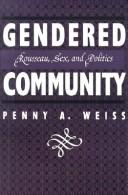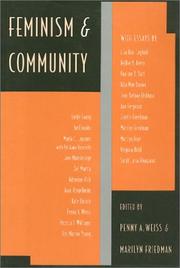| Listing 1 - 10 of 11 | << page >> |
Sort by
|

ISBN: 0814784933 0585183732 9780585183732 9780814792636 0814792634 0814792634 Year: 1993 Publisher: New York, N.Y. New York University Press
Abstract | Keywords | Export | Availability | Bookmark
 Loading...
Loading...Choose an application
- Reference Manager
- EndNote
- RefWorks (Direct export to RefWorks)
Rousseau's writings reflect paradoxes and apparent inconsistencies with his principled commitments to freedom and equality. In this engrossing work, Penny Weiss wrestles with issues of gender in the works of Rousseau. Weiss attempts to resolve apparent inconsistencies by placing them within the context of Rousseau's political philosophy, while avoiding the impulse to attribute his remarks on the sexes to the sexist times in which he wrote, or to his personal idiosyncrasies. A significant contribution to feminist theory, this book addresses the debates concerning Rousseau's understandings of gender, justice, freedom, community, and equality. She also examines how Rousseau's political strategies give rise to a range of important contemporary questions regarding families, citizens, and communities. This new, more complete picture of Rousseau's work will challenge scholars and students of philosophy, politics, and women's studies to look at, and understand, Rousseau in a whole new way. Penny A. Weiss addresses the apparent male/female contradictions that run through the work of the eighteenth-century philosopher Jean-Jacques Rousseau. She argues that Rousseau's defense of sexual differentiation is based on the contribution he perceives it can make to the establishment of community, not on an appeal to some version of natural sex differences. Weiss convincingly demonstrates that Rousseau's political strategy is ultimately unworkable, undermining the very community it was meant to establish.
Sex role. --- Gender role --- Sex (Psychology) --- Sex differences (Psychology) --- Social role --- Gender expression --- Sexism --- Rousseau, Jean-Jacques, --- Views on sex role. --- Rouseau, Jan Jakub, --- Russo, Zhan Zhak, --- Rousseau, John James, --- Rūssū, Jān Jāk, --- Lu-so, --- Ru-xô, Giăng-Giá̆c, --- Rousseau, Jean Jaques, --- Rousseau, Jean Jeacques, --- Rousseau, J. J. --- Rusō, Jan Jakku, --- Rousseau, Gian Giacomo, --- Ruso, Z'an Z'aḳ, --- Rūcō, --- Citoyen de Genève, --- Citizen of Geneva, --- Roussō, --- Rousseau, --- Rūssō, --- Rousseau, Johann Jacob, --- Руссо, Жан-Жак, --- רוסא, זשאן־זשאק --- רוסא, י׳ן י׳ק, --- רוסו, זאאן זאאק, --- רוסו, ז׳אן־ז׳אק, --- روسو، چان چاك --- روسو، ژان ژاك --- 卢梭, --- Rousseau, Juan Jacobo, --- Rousseau, G. G. --- Ruso, Jan Jak, --- Rūsaw, Zhān Zhāk, --- Rūsū, Zhān Zhāk, --- Rousseau, Jean-Jacques --- Gender roles --- Gendered role --- Gendered roles --- Role, Gender --- Role, Gendered --- Role, Sex --- Roles, Gender --- Roles, Gendered --- Roles, Sex --- Sex roles
Book
ISBN: 0271062819 0271062800 9780271062808 9780271035192 0271035196 9780271035208 027103520X Year: 2015 Publisher: University Park, PA
Abstract | Keywords | Export | Availability | Bookmark
 Loading...
Loading...Choose an application
- Reference Manager
- EndNote
- RefWorks (Direct export to RefWorks)
This book is an exercise in the recovery of historical memory about a set of thinkers who have been forgotten or purposely ignored and, as a result, never made it into the canon of Western political philosophy. Penny Weiss calls them “canon fodder,” recalling the fate of soldiers in war who are treated by their governments and military leaders as expendable. Despite some real progress at recovery over the past few decades, and the now-frequent references to a few female thinkers like Mary Wollstonecraft, Hannah Arendt, and Simone de Beauvoir, the surface has only been scratched, and the rich resources of women’s writings about political ideas remain still largely untapped. Included here, and intended to further whet the palate, are figures from Sei Shōnagon, Christine de Pizan, and Mary Astell to Elizabeth Cady Stanton, Anna Julia Cooper, and Emma Goldman. Restoring female thinkers to the conversation of political philosophy is the primary goal of this book. Part I deploys a range of these thinkers to discuss the nature of political inquiry itself. Part II focuses on alternative approaches to and visions of core political ideas: equality, power, revolution, childhood, and community. While mainly an intellectual act of revival, this book also affects practical political life, because “remote and academic as they sometimes appear, debates about what to include in the canon ultimately touch almost everyone: students handed texts from lists of ‘great books’ to guide them . . . and citizens whose governments justify their actions with ideas from political texts deemed classic.";
Women political scientists. --- Women political scientists --- Feminism --- Political scientists --- Women social scientists --- History. --- Political aspects. --- Anna Julia Cooper. --- Canon Fodder. --- Christine de Pizan. --- Elizabeth Cady Stanton. --- Emma Goldman. --- Hannah Arendt. --- Mary Astell. --- Mary Wollstonecraft. --- Sei Shōnagon. --- Simone de Beauvoir. --- Weiss. --- Western political philosophy. --- gender. --- history. --- politics. --- rhetoric. --- thinkers. --- women.
Book
ISBN: 9781439918692 9781439918685 9781439918708 Year: 2021 Publisher: Philadelphia, Pa Temple University Press
Abstract | Keywords | Export | Availability | Bookmark
 Loading...
Loading...Choose an application
- Reference Manager
- EndNote
- RefWorks (Direct export to RefWorks)
Social ethics --- Sociology of the family. Sociology of sexuality --- Feminism --- Children --- Book --- Gender equality --- United States of America
Book
ISBN: 9781479837304 9781479871803 Year: 2018 Publisher: New York, N.Y. New York University Press
Abstract | Keywords | Export | Availability | Bookmark
 Loading...
Loading...Choose an application
- Reference Manager
- EndNote
- RefWorks (Direct export to RefWorks)
Violence --- International --- Labour --- Education --- Political participation --- Racism --- Religion --- Theory --- Reproduction --- Women's organizations --- Book --- Activism --- Ecology
Book
ISBN: 9780814784938 Year: 2020 Publisher: New York, NY
Abstract | Keywords | Export | Availability | Bookmark
 Loading...
Loading...Choose an application
- Reference Manager
- EndNote
- RefWorks (Direct export to RefWorks)
Book
ISBN: 9781479805419 Year: 2018 Publisher: New York, NY
Abstract | Keywords | Export | Availability | Bookmark
 Loading...
Loading...Choose an application
- Reference Manager
- EndNote
- RefWorks (Direct export to RefWorks)

ISBN: 1566392772 Year: 1995 Publisher: Philadelphia Temple University Press
Abstract | Keywords | Export | Availability | Bookmark
 Loading...
Loading...Choose an application
- Reference Manager
- EndNote
- RefWorks (Direct export to RefWorks)
Political philosophy. Social philosophy --- Ethics of family. Ethics of sexuality --- General ethics --- Jewish religion --- Primary groups --- Sociology of culture --- Sociology of minorities --- Sociology of the family. Sociology of sexuality --- Sociology of organization --- Community organization --- Sexology --- Gynaecology. Obstetrics --- Manufacturing technologies --- Ethics --- Feminism --- Family --- Homosexuality --- Judaism --- Female homosexuality --- Liberalism --- Nazism --- Polygamy --- Relationships --- Societies --- Feminist currents --- Textile sector --- Theory --- Friendships --- Women --- Sisterhood --- Women's organizations --- Blackness --- Book --- Abortion --- Abortion centers --- China --- Egypt --- United States of America
Book
Year: 2007 Publisher: Pennsylvania, Pa The Pennsylvania State University Press
Abstract | Keywords | Export | Availability | Bookmark
 Loading...
Loading...Choose an application
- Reference Manager
- EndNote
- RefWorks (Direct export to RefWorks)
Political philosophy. Social philosophy --- Sociology of the family. Sociology of sexuality --- Politics --- Feminism --- Anarchism --- Theory --- Book --- Goldman, Emma --- anno 1800-1899 --- anno 1900-1999 --- United States of America
Book
ISBN: 1479805416 Year: 2018 Publisher: New York : New York University Press,
Abstract | Keywords | Export | Availability | Bookmark
 Loading...
Loading...Choose an application
- Reference Manager
- EndNote
- RefWorks (Direct export to RefWorks)
A wide-reaching collection of groundbreaking feminist documents from around the world Feminist Manifestos is an unprecedented collection of 150 documents from feminist organizations and gatherings in over 50 countries over the course of three centuries. In the first book of its kind, the manifestos are shown to contain feminist theory and recommend actions for change, and also to expand our very conceptions of feminist thought and activism. Covering issues from political participation, education, religion and work to reproduction, violence, racism, and environmentalism, the manifestos together challenge simplistic definitions of gender and feminist movements in exciting ways. In a wide-ranging introduction, Penny Weiss explores the value of these documents, especially how they speak with and to each other. In addition, an introduction to each individual document contextualizes and enhances our understanding of it. Weiss is particularly invested in how communities work together toward social change, which is demonstrated through her choice to include only collectively authored texts. By assembling these documents into an accessible volume, Weiss reveals new possibilities for social justice and ways to advocate for equality. A unique and inspirational collection, Feminist Manifestos expands and evolves our understanding of feminism through the self-described agendas of women from every ethnic group, religion, and region in the world.
Political manifestos. --- Feminist literature. --- Women's rights --- Feminism --- History.

ISBN: 1566392764 Year: 1995 Publisher: Philadelphia Temple University Press
Abstract | Keywords | Export | Availability | Bookmark
 Loading...
Loading...Choose an application
- Reference Manager
- EndNote
- RefWorks (Direct export to RefWorks)
| Listing 1 - 10 of 11 | << page >> |
Sort by
|

 Search
Search Feedback
Feedback About UniCat
About UniCat  Help
Help News
News